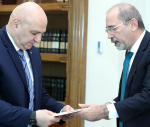You are here
Project Syndicate
Sep 13,2015 - Last updated at Sep 13,2015
“Are they migrants or refugees?” seems to be a question that preoccupies almost everybody who talks about the current humanitarian crisis which forces Middle Easterners and North Africans to cross the Mediterranean.
But that question, or rather debate, has been with us for quite a long time. In fact, it has been coterminous with the rise of the nation-state itself.
Perhaps we badly need to go back to that period of time in the same fashion as Hannah Arendt and Eric Hobsbawm — to mention but two intellectuals — did in “The Origins of Totalitarianism” and “The Age of Revolution”, respectively, for a better approach to that question.
However, I think that it is also helpful to think of a much more recent period. For, the debate over asylum seekers and migrants came to the fore four years ago, in the immediate aftermath of the so-called Arab Spring.
After instability spilled over into North Africa, in general, and Libya, in particular, because of the old regimes’ holding on to power, and due to the lack of unity among the “rebels”, many North Africans undertook perilous “journeys” in search of safety and better living conditions.
Many perished on the way to Europe, while those who survived ended up in European detention centres such as the one on the Italian island of Lampedusa, where they had to experience draconian measures and egregious conditions, with Silvio Berlusconi, the then-Italian prime Minister, describing the newcomers as “a human tsunami”.
Like now, the question asked then was whether they can be considered refugees or migrants, with the second being the preferred designation by most Western media outlets (the implication is that opportunism is imputed to the newcomers).
The difference between refugees and migrants is explicitly demarcated by the United Nations. But perhaps we should instead ask a more fundamental question: What does the Universal Declaration of Human Rights say about people’s movement?
Article 13 reads: “Everyone has the right to leave any country, including his own, and to return to his country.”
This article makes it clear that freedom to move should not be restricted to anybody, be they refugees, migrants or businesspeople.
Thus, the obsession with the semantic distinctions between migrants and refugees is a red herring.
Still, we busy ourselves thinking about those, perhaps marginal, distinctions so much so that we forget about some of the underlying, concrete conditions of the whole crisis, such as asylum policies in the West that were well documented as being cruel by various human rights organisations, cruel practices such as leaving migrants to die in the Mediterranean, and interventionist policies in the Middle East and North Africa.
Moreover, our obsession with those distinctions adds further divisions — migrant vs refugee — to already existing divisions and polarisations.
In addition to the “us” (“civilised” European) and “them” (“uncivilised” non-European) division, “them” is divided into “migrants” and “refugees”, Muslims and Christians, Sunnis and Shiites, Catholics and Protestants, Syrians and Libyans, and so on.
These ostensibly “scientific” categories contribute to antagonising groups, hence a more divided world.
More importantly, those categories facilitate the use of a dehumanising discourse in reference to the non-hegemonic “other” that includes such words as illegal, burden, influx, etc., a discourse that is increasingly leading to disastrous repercussions.
The question that needs to be asked, then, is whether the West thinks of those who head for it as human beings or not.
Perhaps when that question is asked, more realities will surface and the situation can be dealt with head on.
Maybe then Europe and the US will realise that human beings,
Muslims or Christians, will never accept indignity and slavery, even if they are apparently “patient” with it, and they will never stop fighting or running away from indignity.
Otherwise, Europe and the US should not be shocked when people from the “South” haunt them.
The writer, a Fulbright scholar, is professor of English literature at the University of Jordan. He contributed this article to The Jordan Times.











